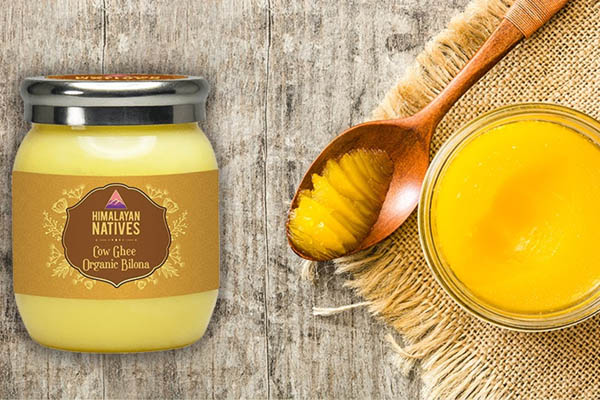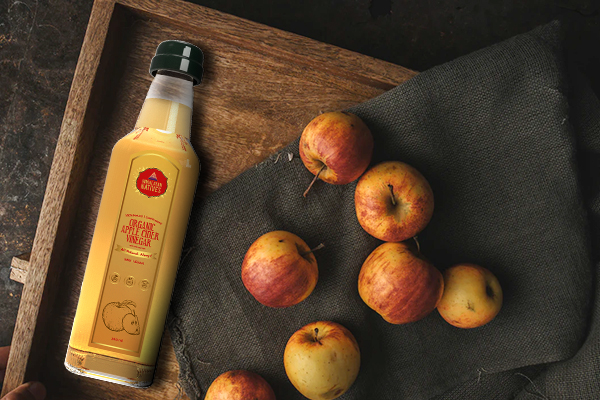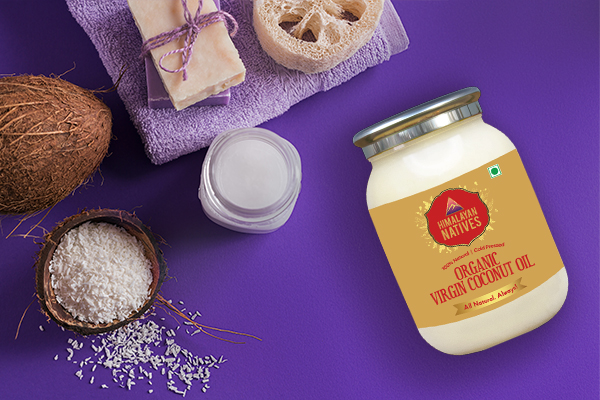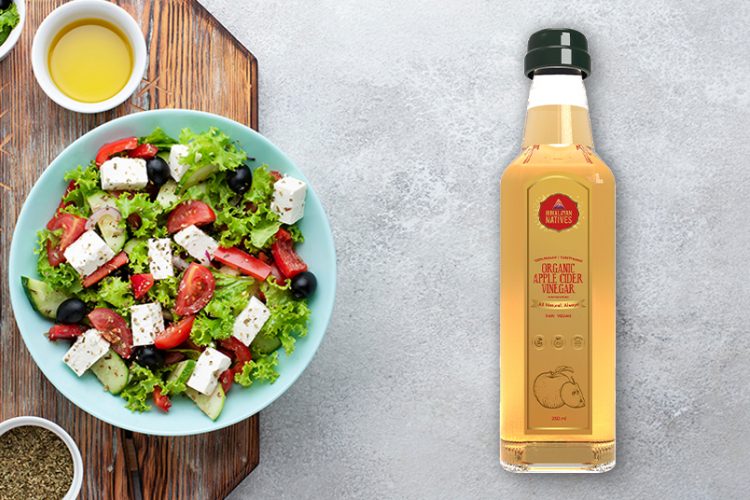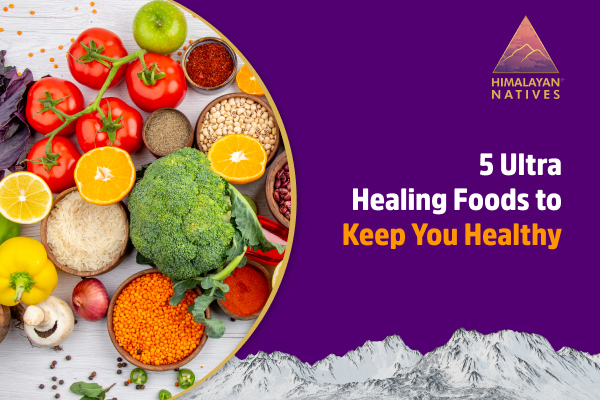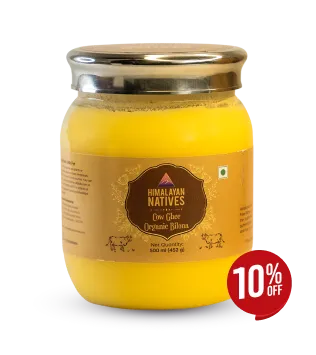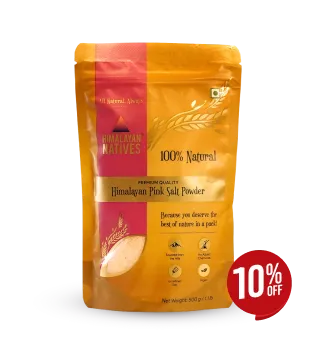Every season has its own unique specialty, however, winter is the most loved one amongst all. The refreshing chilly winds and the various flora that blooms make it a beautiful season. The mountain and hilly regions experience snowfall and display an elegant view while welcoming this holiday season. But winters can get too cold sometimes and so here’s a list of some healthy winter foods and recipes that can help you stay warm and cure the winter blues.
A natural sweetener that is rich in antioxidants and also has some antibacterial and antifungal properties. It is warm in nature and helps in keeping the body warm when taken regularly. It also helps in keeping cold, flu, and cough at bay as it aids in strengthening the immune system. It is, therefore, one of the best foods for cold weather. Consuming warm water with honey and lime first thing in the morning during winters acts like a natural cure for sore throat and helps build resistance against seasonal ailments.
GINGER
A popular Indian spice, which is also widely used for its medicinal properties. It is a great food for winters as it is known for its ability to warm the body temperature by increasing blood circulation and boosting metabolism. You can boil the ginger root in hot water and drink it with lemon and honey. Even better, add it to your morning chai. Who can say no to a hot cup of ginger tea on a winter morning!
DESI GHEE
Ayurveda suggests that
desi ghee is a natural way to cure the pitta (heat element) of your body. It keeps the body warm and also helps in increasing immunity. It is one of the most easily digestible fats and is rich in vitamin A, D, E and K. Ghee also aids digestion, enhances eyesight, and helps in the excretion of toxins. Apart from offering numerous health benefits it also enhances the flavor of the food. Use desi ghee in all your winter dishes, drizzle some over your dal, sabzi, or halwa and make it taste even better.
JAGGERY
Jaggery has a magical property to keep your body warm from within. That is one of the reasons why we see jaggery taking over the market during the winters. It is a healthy alternative to sugar and has many nutritious benefits. It helps improve digestion, immune function, prevents anemia and helps in cleansing the body. Jaggery can be used as a substitute for sugar in your teas, coffees, desserts, and almost in all your sweet winter comfort food recipes.
DRY FRUITS AND NUTS
Dry fruits and nuts like almonds, cashews, are very beneficial during the winters. They speed up the metabolism, increase the body temperature and help stay warm during the winters. Nuts are a great source of iron and protein. They are a great source of copper, calcium, magnesium, potassium, vitamin A, C, E, K, B6, and zinc. They are a great mid-meal snack and can also be added to many of your healthy winter recipes.
CINNAMON
Cinnamon is an antioxidant-rich spice that plays an important role in keeping the body healthy, fighting free radicals, and removing unwanted toxins from the body. It also has anti-inflammatory properties and can help reduce swelling which is beneficial to avoid long-term health issues like diabetes and heart diseases. This winter superfood increases the body’s metabolism and generates heat thereby keeping the body warm and making it a great food for cold weather. It also helps in curing cough and cold which is a common ailment during the winters so try and add it to your winter recipes wherever possible.
SAFFRON
This incredible spice is one of the most expensive spices in the world. Ayurveda has prized saffron because of its warming capacity hence it is used in many home remedies for treating cough and cold. It is high in antioxidants and helps protect cells against free radicals and oxidative stress. It is sometimes called the ‘sunshine spice’ not just due to its distinct color but because it may help brighten your mood.
MUSTARD
Mustard is known for being hot in nature. Due to its warming properties, they build heat in the body and keep the body warm. It is filled with antioxidants-isothiocyanates and sinigrin that are known to possess antibacterial, antiviral, antifungal, anti-inflammatory, and wound healing properties. Thanks to its versatile forms: mustard oil, mustard seeds, and mustard leaves, it can be used in many winter recipe ideas.
Winter is a great time to indulge in eating since it offers a great variety of seasonal vegetables and fruits, especially greens. We hear the word winters and foods like Sarson ka Saag, Gajar ka halwa, Panjiri, Kesar Doodh, Masala Chai, Methi ke Paranthe, etc. pop in our heads. Let us have a look at a few of these winter recipes.
GAJAR KA HALWA
Ingredients:
- 500 gms Carrots
- 500 ml Full fat milk
- 250 gms Condensed milk and natural sweetener
- 1 tsp Cardamom powder
- 4 tbsp Ghee
- 1/3 cup Cashews and almonds slivered and fried in ghee
- 1/4 cup Raisins
Method:
- Wash and peel the carrots.
- Grate them to medium thickness as it would give a better texture.
- In a large pan heat 2 tbsps of ghee, add the carrots, and fry on medium heat.
- Sauté the carrots for 4 to 5 mins until it turns slightly tender.
- Then add the milk to the carrots and let it simmer.
- Stir frequently.
- Add 2 tablespoons of cow ghee.
- Cook until the milk is fully absorbed and the carrots are soft and cooked.
- Check for the sweetness, add condensed milk, sweetener(optional), and cardamom powder.
- Garnish with raisins, almonds, and cashews.
- Add some Himalayan Natives ghee for that extra flavor.
- Best served warm.
SARSON KA SAAG
Ingredients:
- 300 grams sarson ka saag
- 100 grams palak
- 100 grams bathua
- 2-3 roughly chopped green chilies
- 1 finely chopped onion
- ¼ cup grated radish
- 1 finely chopped tomato
- 3-4 chopped garlic cloves
- 1-inch grated ginger
- ½ tbsp turmeric powder
- 1 tbsp cumin seeds
- ½ tbsp chili powder
- 2-3 dried whole red chilies
- 4 tbsp makki ka atta
- Pinch of heeng
- Salt to taste
- 3 tbsp ghee
- For the tadka
- 5-6 finely sliced garlic cloves
- 1-2 red chilies
- 2 tbsp ghee
Method:
- In a heavy bottom pan, put all the greens together along with roughly chopped green chilies.
- Add ½ cup water, cover, and cook until the leaves are done well. The water released from the greens will cook them well. It takes around 20 minutes to cook the greens in the pot.
- Once the greens are done, cool them a bit and put them into a blender to make a coarse puree.
- Add makki ka atta and mix well.
- In a heavy bottom kadhai heat ghee. Add cumin seeds and allow them to crackle.
- Now add whole red chilies and fry for a few seconds.
- Add garlic, ginger, and green chilies and fry until they are aromatic.
- Add heeng and onion and fry until just pink.
- Now, add grated mooli and cook for a minute.
- Add tomato and sauté on high until they are soft.
- Now, add boiled saag puree and combine well.
- Then add red chili powder and turmeric powder.
- Cook for 10-15 minutes on low, stirring occasionally.
- For tadka, heat ghee in a pan, add garlic and fry, add red chilies and fry for a few seconds. Pour the tadka over the saag.
- Dish out and top with some ghee.
- Serve Sarson ka Saag with Makki ki Roti, jaggery.

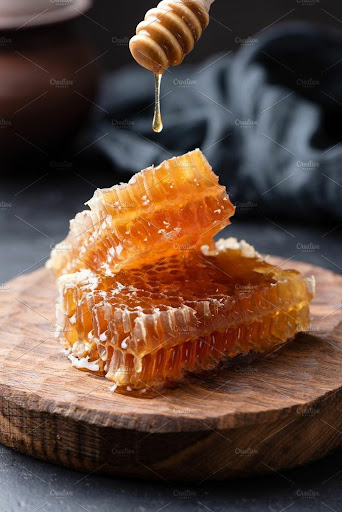



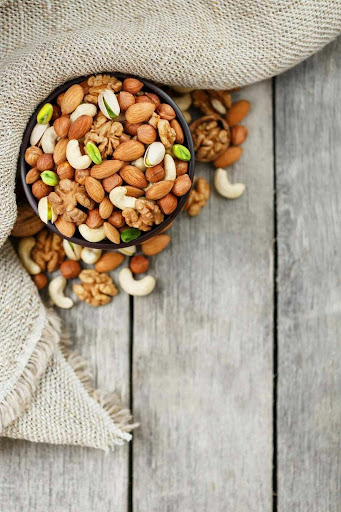
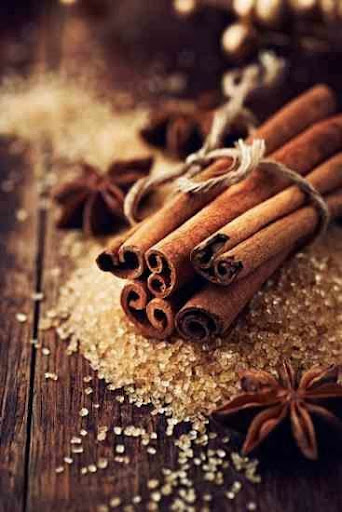

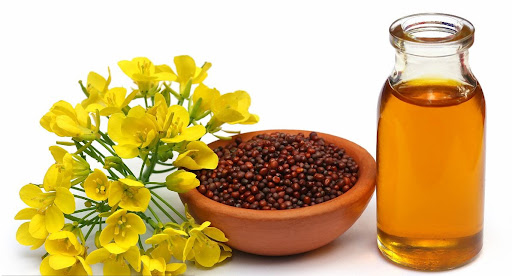
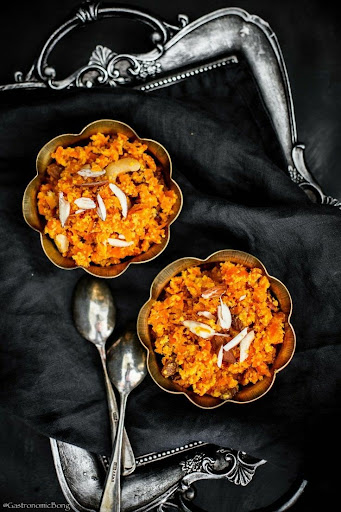
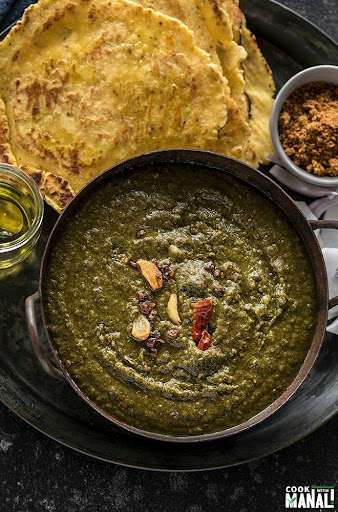
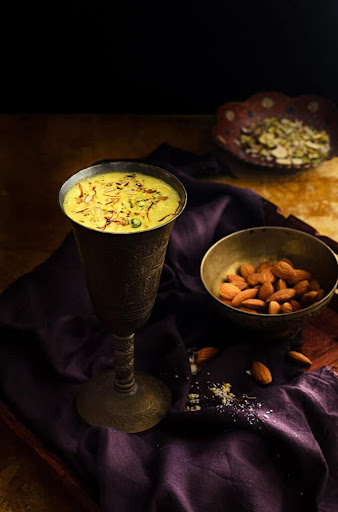
 HELPFUL0 people found it helpful
HELPFUL0 people found it helpful







